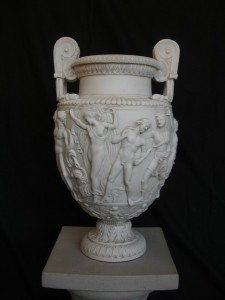Ode on a Grecian Urn
Jack Ramey reads Ode on a Grecian Urn.
Thou still unravish’d bride of quietness,
…..Thou foster-child of silence and slow time,
Sylvan historian, who canst thus express
…..A flowery tale more sweetly than our rhyme:
What leaf-fring’d legend haunts about thy shape
…..Of deities or mortals, or of both,
…..In Tempe or the dales of Arcady?
What men or gods are these? What maidens loth?
…..What mad pursuit? What struggle to escape?
……….What pipes and timbrels? What wild ecstasy?
Heard melodies are sweet, but those unheard
…..Are sweeter; therefore, ye soft pipes, play on;
Not to the sensual ear, but, more endear’d,
…..Pipe to the spirit ditties of no tone:
Fair youth, beneath the trees, thou canst not leave
…..Thy song, nor ever can those trees be bare;
…..Bold Lover, never, never canst thou kiss,
Though winning near the goal yet, do not grieve;
…..She cannot fade, though thou hast not thy bliss,
…..…..For ever wilt thou love, and she be fair!
Ah, happy, happy boughs! that cannot shed
…..Your leaves, nor ever bid the Spring adieu;
And, happy melodist, unwearied,
…..For ever piping songs for ever new;
More happy love! more happy, happy love!
…..For ever warm and still to be enjoy’d,
…..For ever panting, and for ever young;
All breathing human passion far above,
…..That leaves a heart high-sorrowful and cloy’d,
…..…..A burning forehead, and a parching tongue.
Who are these coming to the sacrifice?
…..To what green altar, O mysterious priest,
Lead’st thou that heifer lowing at the skies,
…..And all her silken flanks with garlands drest?
What little town by river or sea shore,
…..Or mountain-built with peaceful citadel,
…..Is emptied of this folk, this pious morn?
And, little town, thy streets for evermore
…..Will silent be; and not a soul to tell
…..…..Why thou art desolate, can e’er return.
O Attic shape! Fair attitude! with brede
…..Of marble men and maidens overwrought,
With forest branches and the trodden weed;
…..Thou, silent form, dost tease us out of thought
As doth eternity: Cold Pastoral!
…..When old age shall this generation waste,
…..Thou shalt remain, in midst of other woe
Than ours, a friend to man, to whom thou say’st,
…..“Beauty is truth, truth beauty,—that is all
…..…..Ye know on earth, and all ye need to know.”
Poem by John Keats (1795–1821)
Photo: Reproduction of Townley Vase by Sculptured Arts Studio
Jack Ramey talks about John Keats and reads Ode on a Grecian Urn.
.
Some say that Keats was inspired to write his Ode on a Grecian Urn after seeing the Elgin Marbles in the British Museum. Others maintain it was the Townley Vase that fired his imagination. Neither of these objects, however, contain the wealth of detail that exists in the poem.
 In it, the poet contemplates the eternal nature of art and the fleeting nature of life. He relates a scene where an ancient village empties itself out and its citizens walk to a pagan sacrifice accompanied by pipes and drums and wild ecstasy. A lover tries to kiss a maiden who is “loath” to accept his advances on this pious morn. She will never be his, but she will always be young and desirable. Art and beauty passed down through the ages trump reality, Keats seems to say, by being forever unchanging, forever young, forever new.
In it, the poet contemplates the eternal nature of art and the fleeting nature of life. He relates a scene where an ancient village empties itself out and its citizens walk to a pagan sacrifice accompanied by pipes and drums and wild ecstasy. A lover tries to kiss a maiden who is “loath” to accept his advances on this pious morn. She will never be his, but she will always be young and desirable. Art and beauty passed down through the ages trump reality, Keats seems to say, by being forever unchanging, forever young, forever new.
When I was in London two summers ago, I tried to see the Townley Vase at the British Museum, but it was not on display, kept in a locked room in the basement, available only through prearranged appointment. But I did spend time with the Elgin marbles and their scenes of sacrifice infamously ripped off the façade of the Parthenon in Athens by Lord Elgin, an act of looting famously condemned by Lord Byron and the Greek government. Keats’s famous last lines of the Ode still resonate and acted for me as a poetic voiceover to the Elgin marbles: ”Beauty is truth, truth beauty. That is all ye know on earth and all ye need to know.”
Painting of John Keats by Joseph Severn (1793–1879)
via Wikimedia Commons
Related Poem: Ode to a Nightingale

